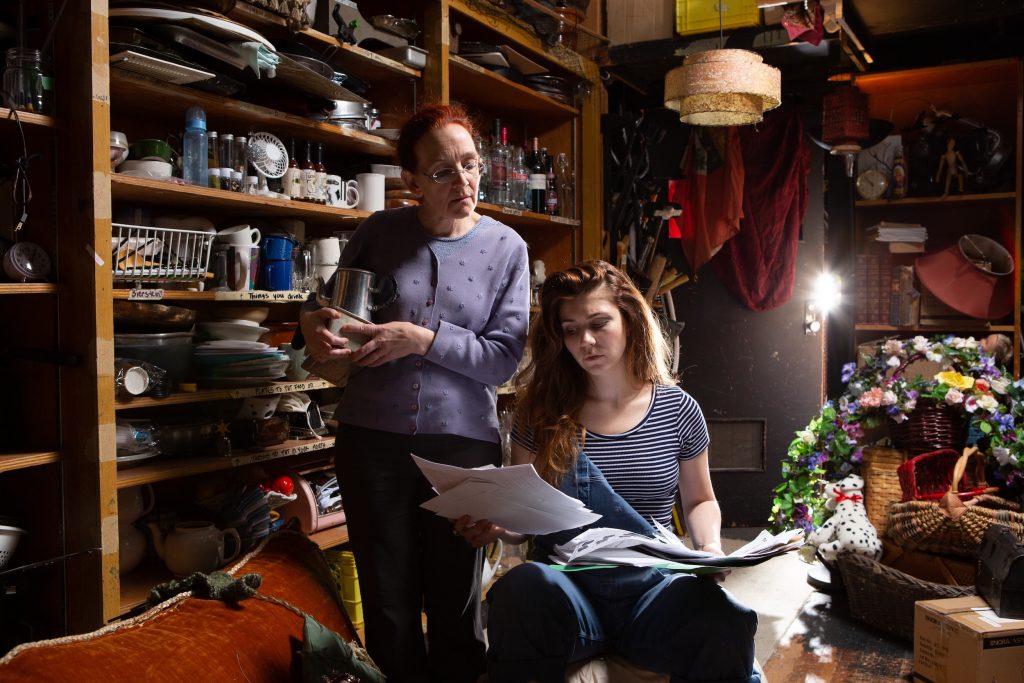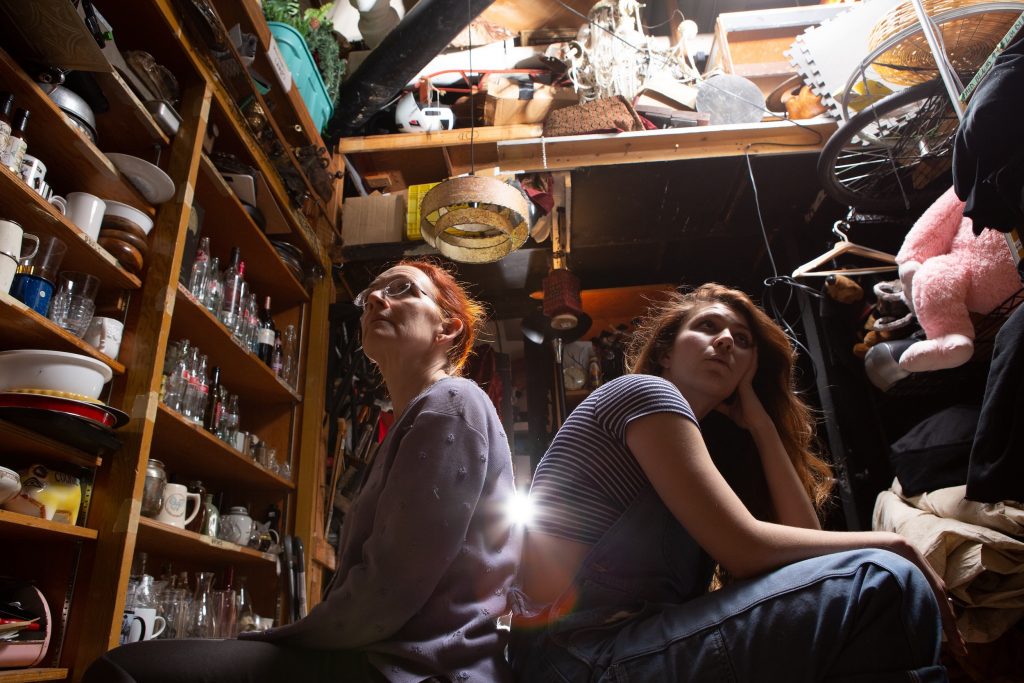
Credit: Tina Krueger Kulic
At Studio 16 until May 5, 2019
Tickets from $28 at tickets.theatrewire.com
Posted April 20, 2019
In the playwright’s program notes (playwright Dave Deveau hates them; I love them), Deveau writes that death is something he has had a lot of experience with since a young age, including the death of very young schoolmates and, more recently, his aunt. Who knew? Deveau is always upbeat, charming and funny but clearly, behind that almost cherubic appearance, there’s a lot going on.
And there’s a lot going on in Dead People’s Things. Jenn Stewart’s set – floor to ceiling piled with cartons each with a post-it note marked “Trash” or “Keep” – is the tip-off. There’s so much stuff to deal with; who knows what’s in all those boxes? And it appears there was a lot of ‘stuff’ going on in the recently deceased’s life.
Millennial Phyllis (Meaghan Chenosky) arrives at the deceased aunt’s house in torn jeans, boots and braids to discover neighbour and executrix Beatrice (Eileen Barrett) already in the house that has been left to Phyllis by her aunt. Beatrice has been the aunt’s neighbour for years and, although (strangely) she has never been in the house – even for tea – she has driven the aunt around, shopped with her, been a good neighbour to her.
Phyllis claims she never knew her aunt – her mother’s estranged sister – and is bewildered but grateful to have inherited the house. With no ties to it, she plans to sell it and take the money. Beatrice is outraged.

Credit: Tina Krueger Kulic
In fact, Beatrice arrives outraged and remains outraged for much of Dead People’s Things. We keep expecting to understand why but, frankly, we’re never quite sure. And we’re curious about the hostility between Phyllis’s mother (now also deceased) and Phyllis’s aunt – and we never really find out. It’s got to be more than sibling rivalry. And we think we will eventually find out why the aunt left the house to a niece she never knew (although it turns out there was some early childhood contact) – but we, sort of, don’t.
In the director’s notes, Zee Zee Theatre’s managing artistic director Cameron Mackenzie (Deveau’s husband) says this play took Deveau seven years to write possibly because it’s personal and “there were too many micro-stories [Deveau] wanted to tell”. And it shows. There are so many interesting threads to follow that never get woven into a satisfying whole. And, with material this promising, we want to get to the bottom of it all.
Under the direction of Mackenzie, Barrett does the best she can but she doesn’t have much scope until very late in the play. The ‘surprise’ at the end doesn’t come as much of a surprise although it goes some way in explaining Bea’s emotional instability. The hug, when it finally comes, is good.

Credit: Tina Krueger Kulic
Chenosky has greater range in the role of Phyllis. She arrives with a “let’s get on with it attitude” (she can’t inherit until she’s dealt with the boxes; that’s the deal) and ends up falling apart – more, we think, over her mother’s death and the state of her own life which seems to involve an always handy bottle of tequila or scotch.
If Deveau takes Dead People’s Things back to the drawing board, he may want to tie off some more loose ends. What about those baby booties in one of the boxes? Why are some faces cut out of the family album? Spoiler alert: why did the aunt – who may or may not be called Phyllis – kill herself? (Beatrice says at the beginning of the play that she once knew someone called Phyllis but she didn’t like her much. Would that be Aunt Phyllis? And if she was Aunt Phyllis why did the estranged sister name her baby after the sister she hated? Or, imagination going wild here, maybe young Phyllis really is the aunt’s baby, taken away from her at birth by her wicked sister. So many possibilities; not enough clues.)
A world première, good set, some nice lighting effects by Sophie Tang, a credible performance by Chenosky, tough slog for Barrett and a heartfelt resolution for Phyllis: “My aunt never figured out what she wanted to be. She’s given me the opportunity.”
I like that.

